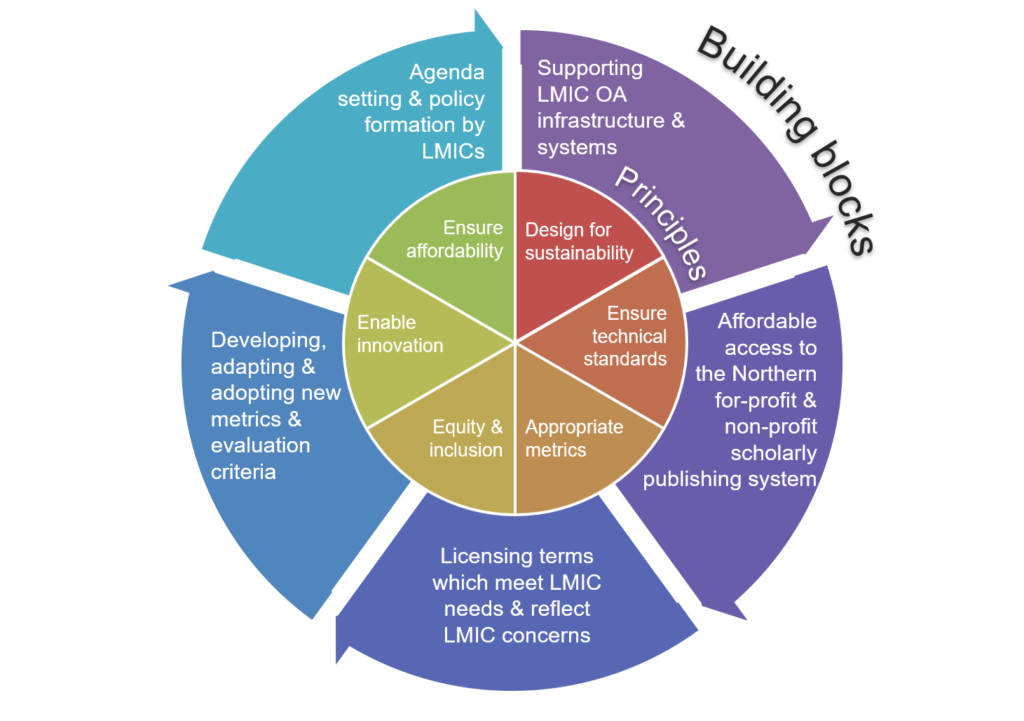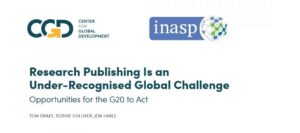
Open Access: challenges and opportunities for LMICs and the potential impact of UK policy
In late 2019, INASP was commissioned by three UK funders to undertake a consultation to understand the challenges and opportunities that Open Access (OA) presents to low- and middle-income country (LMIC) stakeholders.
The consultation was commissioned by the Foreign, Commonwealth and Development Office (FCDO), in cooperation with the National Institute for Health Research (NIHR) and UK Research and Innovation (UKRI) in the context of a significant increase in the UK’s Official Development Assistance (ODA)-funded research spending. FCDO, NIHR and UKRI wished to understand the potential impact of UK OA policies on LMIC research, and how any unintended impacts can be mitigated.
At a time of rapid development in the Open Access (OA) and funding landscape, we’re pleased to share the findings and our recommendations in our recently published report.
Key findings
In total we consulted 335 individuals representing 213 institutions in 52 countries. The evidence points to five over-arching issues which we explore in more detail in the report:
1. OA is seen to be of significant benefit to LMICs but there is uncertainty and confusion about what OA entails and tensions in the ways in which OA interacts with prestige, impact and recognition.
2. There is convergence in the ambitions of LMIC and Northern stakeholders in relation to open access, but divergence in their approaches to achieving this. Northern policy needs to be more flexible, and LMIC agencies need to be able to determine their own policy and regulatory tools.
3. LMIC-led and managed journals and other publishing platforms are critical parts of national and regional research systems.
4. Northern-published journals are important for LMIC researchers but the costs of publishing in them are unaffordable.
5. The ways in which research is evaluated significantly shape OA perceptions and behaviour.
6 Principles and 5 building blocks of a more equitable OA environment for LMICs
From this evidence base we identify 6 principles which we believe any new OA policy would need to satisfy.

Principles
- Ensure affordability: The costs of OA publishing should be affordable through the resources available to LMICs.
- Design for sustainability: The cost of maintaining OA infrastructure, platforms or tools should be sustainable within the resources available to LMICs.
- Ensure technical standards: OA infrastructure, platforms and tools should be technically sophisticated enough to meet internationally recognised standards, and to allow interoperability wherever possible.
- Appropriate metrics: Research metrics and research evaluation mechanisms should identify the quality and relevance of the underlying research rather than the outlet in which research is published.
- Equity and inclusion: Access to the necessary OA infrastructure, platforms and tools, should be founded on equitable partnerships between LMIC researchers and their local and international peers.
- Enable innovation: Funders and other external actors should enable innovation within research and publishing ecosystems, such that new models are able to emerge and incumbent business models are not unfairly protected.
Building blocks
- Agenda setting and policy formulation by LMICs: recognise the role that LMICs science agencies must play in formulating OA and related research policy and systems, and in supporting the development of the national research environment.
- Supporting LMIC OA infrastructure and systems: LMIC countries must be able to develop their own infrastructure to support research and OA publication.
- Affordable access by LMICs to the Northern for-profit and non-profit scholarly publishing system: The costs of the existing publishing system, must be reformed to accommodate the needs and circumstances of LMIC researchers.
- Developing, adapting and adopting appropriate research metrics and evaluation criteria: The quality of research and data must recognised on its own merits, and more objective measures of the quality of a publishing platform or outlet are provided.
- Licensing terms which meet LMIC needs and reflect LMIC concerns: Funders should take into account the concerns of LMIC stakeholders related to the commercial use of their work.
There will be tensions to resolve between these principles and building blocks, and they are not mutually exclusive options. Our report includes recommendations for specific policy responses and supporting actions in each of these areas.
Achieving full and equitable OA to research requires a major transition in the scholarly publishing ecosystem. While ensuring that policies reflect LMIC needs is essential, the nature of research and publishing, and the interconnected nature of research systems mean that OA policy change alone will not be sufficient to drive and enable a positive transition for LMICs. Policy and supporting actions, at global, regional, national and institutional levels must also address issues related to research assessment, research careers, and encourage and enable changes to broader research cultures and behaviours.
Read the full report here.
Cover artwork by Vrushali Dandawate, DOAJ Ambassador, India

 Previous Post
Previous Post Next Post
Next Post


